In-Depth Reports
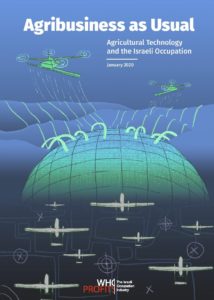
Agribusiness as Usual
In this report, Who Profits shows that Israeli agritech companies are deeply complicit in the ongoing occupation of Palestinian and Syrian land. The report exposes the contribution of agritech firms to agriculture in illegal settlements and examines their role in the Israeli blockade of Gaza. It investigates the reciprocal ties that exist between the Israeli agritech and military industries and highlights the economic gains made by Israeli agritech industries through their collaboration with the Israeli military apparatus.
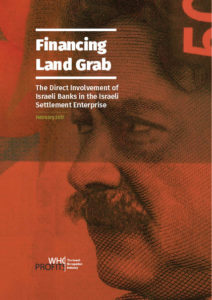
Financing Land Grab
Israeli banks provide the financial infrastructure for all the activities of companies, governmental agencies and individuals linked to the continuing occupation of Palestinian land. The following report, titled Financing Land Grab: The Direct Involvement of Israeli Banks in the Israeli Settlement Enterprise, focuses on the central role that Israeli banks play in construction and infrastructure projects in West Bank and East Jerusalem settlements and in providing loans to regional and local councils of settlements in the West Bank. The findings of this report reveal that all Israeli banks except Dexia Israel provide special loans to construction and infrastructure projects in settlements in the West Bank and East Jerusalem. In addition, all Israeli banks with no exception provide loans and financial services to local and regional councils of Israeli settlements in the West Bank.
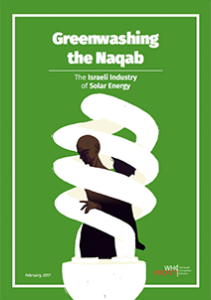
Greenwashing the Naqab
This flash report comes as a follow up report for Who Profit’s in depth report titled “Greenwashing the occupation: The solar energy industry and the Israeli occupation”, which was published in February 2017. While the latter exposes the political economy of Israeli solar energy in the occupied West Bank, particularly in the Jordan Valley area, this flash report sheds light on Israel’s capitalist ventures of solar energy projects in the Naqab (Negev) area where the native population of Palestinian Bedouins, faces acute and severe living conditions alongside forcible displacement policies.
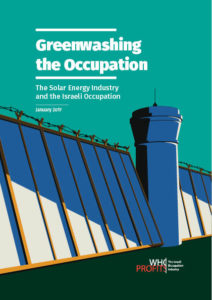
Greenwashing the Occupation
This report scrutinizes the Israeli solar energy industry by exposing corporate involvement in commercial solar fields and residential solar systems that have been built on occupied Palestinian land, particularly in the Jordan Valley. It also provides a legal analysis of Israel’s violations of international law as an occupying power and the companies’ breaches of business and human rights frameworks. Finally, the report illustrates the intricacies of the captive Palestinian market, highlights the Israeli politics of debts and examines the viability of the Palestinian renewable energy market under occupation.
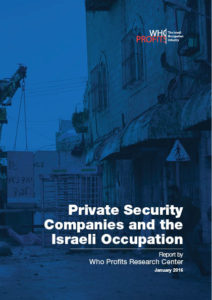
Private Security Companies and the Israeli Occupation
Private security companies in Israel play an active role in the occupation of Palestinian land and control over Palestinian people. Private security guards operate checkpoints and guard settlements in the West Bank and East Jerusalem. These security guards have policing powers, they bear arms and are entitled to use force in performing their duties. In the settlements in the West Bank and East Jerusalem, the private security guards, who are hired by the state of Israel to guard the settlements, de facto serve as a private police force that serves the settlers population. The employment of private security guards enables state authorities to provide security services only to the settlers, without acknowledging or meeting the security needs of the Palestinian communities around the settlements. This situation creates an inherent inequality between the Palestinian and the Jewish population in the West Bank and East Jerusalem.
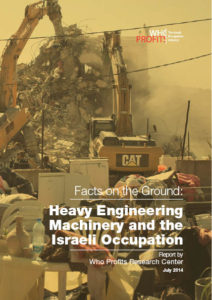
Facts on the Ground
Since the early days of the 1967 occupation, Israel has used heavy construction machinery in order to strengthen its hold over the Palestinian territories and Palestinian people by “establishing facts on the ground.” As the Israeli heavy machinery market is based on import, multinational corporations supply the local demand. This report will describe in depth how – in the hands of the Israeli army, Israeli authorities, settlers and corporations operating in the OPT – construction machinery became a vital component of the occupation mechanism.
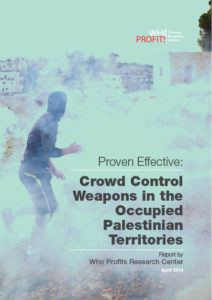
Proven Effective
Through three types of “non-lethal” crowd control weapons as case studies, the following report highlights the harmful consequences of such weapons, including their potentially lethal effects. Additionally the report addresses how the occupied Palestinian territories are being used as a lab for testing new weapons for civil oppression on humans, in order to label them as “proven effective” for marketing abroad.
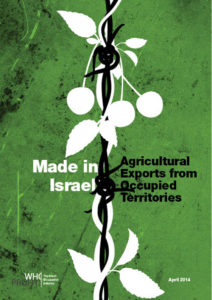
Made in Israel
Who Profits' report concerns the major Israeli agricultural export companies presently operating in occupied territories. The report demonstrates the severe implications of an Israeli-only agriculture in occupied Palestinian and Syrian lands.



